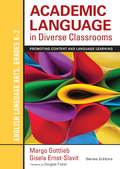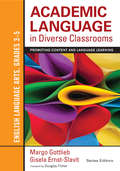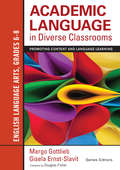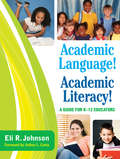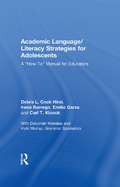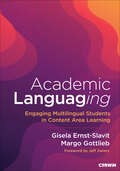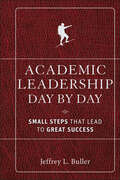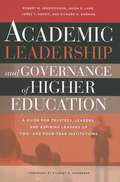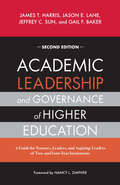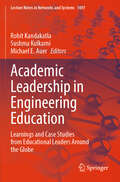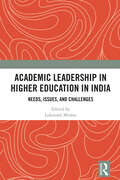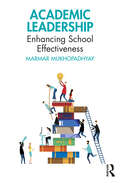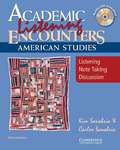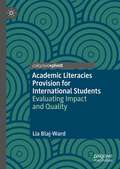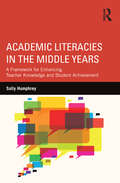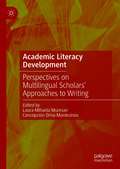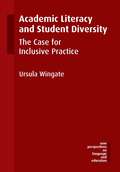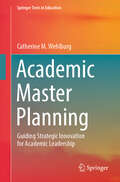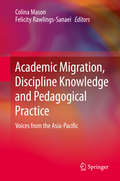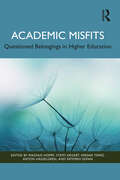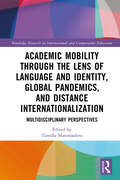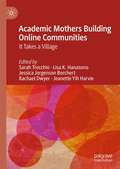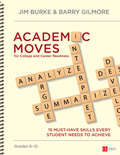- Table View
- List View
Academic Language in Diverse Classrooms: Promoting Content and Language Learning
by Dr Margo Gottlieb Gisela Ernst-SlavitMake every student fluent in the language of learning. The Common Core and ELD standards provide pathways to academic success through academic language. Using an integrated Curricular Framework, districts, schools and professional learning communities can: Design and implement thematic units for learning Draw from content and language standards to set targets for all students Examine standards-centered materials for academic language Collaborate in planning instruction and assessment within and across lessons Consider linguistic and cultural resources of the students Create differentiated content and language objectives Delve deeply into instructional strategies involving academic language Reflect on teaching and learning
Academic Language in Diverse Classrooms: Promoting Content and Language Learning
by Dr Margo Gottlieb Gisela Ernst-SlavitMake every student fluent in the language of learning. The Common Core and ELD standards provide pathways to academic success through academic language. Using an integrated Curricular Framework, districts, schools and professional learning communities can: Design and implement thematic units for learning Draw from content and language standards to set targets for all students Examine standards-centered materials for academic language Collaborate in planning instruction and assessment within and across lessons Consider linguistic and cultural resources of the students Create differentiated content and language objectives Delve deeply into instructional strategies involving academic language Reflect on teaching and learning
Academic Language in Diverse Classrooms: Promoting Content and Language Learning
by Dr Margo Gottlieb Gisela Ernst-SlavitMake every student fluent in the language of learning. The Common Core and ELD standards provide pathways to academic success through academic language. Using an integrated Curricular Framework, districts, schools and professional learning communities can: Design and implement thematic units for learning Draw from content and language standards to set targets for all students Examine standards-centered materials for academic language Collaborate in planning instruction and assessment within and across lessons Consider linguistic and cultural resources of the students Create differentiated content and language objectives Delve deeply into instructional strategies involving academic language Reflect on teaching and learning
Academic Language! Academic Literacy!: A Guide for K–12 Educators
by Eli R. JohnsonThis practical guide provides 36 hands-on strategies for helping ELLs learn the necessary skills to decipher academic language in reading, writing, listening, and speaking.
Academic Language/Literacy Strategies for Adolescents: A "How-To" Manual for Educators
by Debra L. Hirai Irene Borrego Emilio Garza Carl T. KloockFast-paced, practical, and innovative, this text for pre-service and in-service teachers features clear, easily accessible lessons and professional development activities to improve the delivery of academic language/literacy education across the content areas in junior/middle school and high school classrooms. Numerous hands-on tools and techniques demonstrate the effectiveness of content-area instruction for students in a wide variety of school settings, particularly English language learners, struggling readers, and other special populations of students. Based on a strong professional development model the authors have been instrumental in designing, Academic Language/Literacy Strategies for Adolescents addresses: motivation attributes of academic language vocabulary: theory and practice reading skills development grammar and writing. A wealth of charts, graphs, and lesson plans give clear examples of academic language/literacy strategies in action. The appendices – a key component of the practical applications developed in the text – include a glossary, exemplary lessons that address key content areas, and a Grammar Handbook. In this era of increased accountability, coupled with rapid demographic change and challenges to traditional curricula and pedagogical methods, educators will find this book to be a great resource.
Academic Languaging: Engaging Multilingual Students in Content Area Learning
by Gisela Ernst-Slavit Margo GottliebRethink how academic languaging can transform content area teaching For years, the teaching of content-based academic language to multilingual learners has focused on formulas, vocabulary lists, and sentence patterns—often sidelining students’ linguistic and cultural strengths. Gisela Ernst-Slavit and Margo Gottlieb address these challenges by embracing academic languaging, an active, collaborative student-driven process. Academic Languaging offers strategies to integrate language and content learning while fostering student engagement, voice, and agency. Dedicated chapters on academic languaging for Language Arts, Mathematics, Social Studies, and Science highlight the dimensions of disciplinary language for each subject and provide strategies for moving learning forward with multilingual learners. Additional features include: "Stop and Think" prompts to help educators connect new ideas with their instructional settings Prompts at the end of each chapter to encourage deeper thinking and application of the material Multilingual examples to mirror the varied classroom settings in the U.S. and beyond. The ultimate resource for educators committed to empowering multilingual learners and fostering meaningful, culturally sustaining education, Academic Languaging ensures multilingual learners comprehend academic content and thrive as confident, autonomous drivers of their own learning.
Academic Languaging: Engaging Multilingual Students in Content Area Learning
by Gisela Ernst-Slavit Margo GottliebRethink how academic languaging can transform content area teaching For years, the teaching of content-based academic language to multilingual learners has focused on formulas, vocabulary lists, and sentence patterns—often sidelining students’ linguistic and cultural strengths. Gisela Ernst-Slavit and Margo Gottlieb address these challenges by embracing academic languaging, an active, collaborative student-driven process. Academic Languaging offers strategies to integrate language and content learning while fostering student engagement, voice, and agency. Dedicated chapters on academic languaging for Language Arts, Mathematics, Social Studies, and Science highlight the dimensions of disciplinary language for each subject and provide strategies for moving learning forward with multilingual learners. Additional features include: "Stop and Think" prompts to help educators connect new ideas with their instructional settings Prompts at the end of each chapter to encourage deeper thinking and application of the material Multilingual examples to mirror the varied classroom settings in the U.S. and beyond. The ultimate resource for educators committed to empowering multilingual learners and fostering meaningful, culturally sustaining education, Academic Languaging ensures multilingual learners comprehend academic content and thrive as confident, autonomous drivers of their own learning.
Academic Leadership Day by Day
by Jeffrey L. BullerIt can seem at times as though all of academic administration today is focused only on the need for continual change and the endless pursuit of "the big idea." But most academic leaders, from department chairs and program directors through university presidents and chancellors, are far too busy helping their institutions flourish for them to divert critical energy and resources to yet another untried theory or management principle. Academic Leadership Day by Day takes an entirely different approach to developing your proven academic leadership: It introduces one practical and field-tested idea each day for an entire academic year. Rather than requiring you to devote days or even weeks to administrative training (which may prove to be of little use in the end), this manual gives you no-nonsense suggestions that you can consider on even your busiest days. Experiment with the suggestions made each day, discover what works for you, and then build on your successes for the benefit of your institution and its programs. Significant improvements often result from small, gradual, and consistent efforts, and Academic Leadership Day by Day is your guide to becoming a more accomplished, confident academic leader a few minutes at a time.
Academic Leadership and Governance of Higher Education: A Guide for Trustees, Leaders, and Aspiring Leaders of Two- and Four-Year Institutions
by Jason E. Lane Robert M. Hendrickson James T. Harris and Richard H. DormanTo meet the new and rapidly changing demands facing today’s higher education managers and leaders – from department chairs to trustees – this book offers guidance on how to effectively discharge their responsibilities and how to develop their skills for managing their relationships with internal and external stakeholders. It also provides a broad understanding of the structure and functions of their institution and of the appropriate loci of decision-making. <p><p> The authors go beyond the “positions” of leadership to emphasize the qualities of creativity, commitment, collaboration, delegation and courage that are essential to steer a unit, college or university through successful and enduring change <p> Recognizing that the hallmark of higher education in the United States is a diversity of institutional types, this book enables the reader to relate issues of environment, organization and management to his or her specific institution, from not only the presidential perspective, but from the vantage point of trustees, provosts, vice presidents, deans, and department heads. By covering all these functions―as well as the role of external stakeholders―in a single volume, this book offers readers a comprehensive view of how institutions respond to external forces and internal issues, and how these impact organizational structure, functions and decision-making in their roles, and the institution at large.
Academic Leadership and Governance of Higher Education: A Guide for Trustees, Leaders, and Aspiring Leaders of Two- and Four-Year Institutions
by Jason E. Lane Jeffrey C. Sun James T. Harris Gail F. BakerWinner of the 2012 ASHE/CAHEP Barbara Townsend Lecture AwardTo prosper and thrive in an increasingly unpredictable national and global environment, U.S. higher education will need to adapt, innovate, and evolve once again, as it has during every major societal change over the past four centuries.The purpose of this new edition, published a turbulent decade after the first, is to provide institutional leaders -- from department chairs to trustees -- with a broad understanding of the academic enterprise, strategic guidance, and key principles, to assist them in navigating the future and drive the success of their institutions as they confront the unimagined.Recognizing that the hallmark of higher education in the U.S. is the diversity of institution types, each of which is affected differently by external and internal influences, the authors provide examples and ideas drawn from the spectrum of colleges and universities in the not-for-profit sector.This book covers the major functions and constituent departments and units within institutions; the stakeholders from students and faculty through the echelons of administration; the external environment of elected officials, foundations, philanthropists, and the new changing media; and innovations in teaching, technology, data analytics, legal frameworks, as well as economic, demographic, and political pressures.The book is informed by the proposition that adhering to four principles--which the authors identify as having enabled institutions of higher education to successfully navigate ever-changing and volatile pasts--will enable them to flourish in the coming decades:The four principles are:1. Be mission centric by making all key decisions based on a core mission and set of values.2. Be able to adapt to environmental change in alignment with the mission and core values.3. Be committed to democratic ideals by seeking to promote them and modeling democratic practices on and off campus.4. Be models for inclusion, equity, and positive social change.
Academic Leadership in Engineering Education: Learnings and Case Studies from Educational Leaders Around the Globe (Lecture Notes in Networks and Systems #1097)
by Michael E. Auer Rohit Kandakatla Sushma KulkarniEngineering institutions worldwide are undergoing significant transformation as they work to adapt themselves to the learning needs of students in the 21st century, changing trends in the requirements of the industry and society, and growing concerns about issues related to sustainable development and climate change. Future engineering graduates must be equipped to tackle complex problems in society that are aligned with the United Nation’s Sustainable Development Goals (SDGs). There are increasing calls for engineering institutions to create quality learning experiences for students, enabling them to develop deeper learning skills such as critical thinking, problem-solving, life-long learning, leadership skills, and the ability to work in teams. Engineering curricula must be made multidisciplinary, innovative, and outcome-driven by integrating evidence-based pedagogies and learning mechanisms. For this to happen, academic leaders must reimagine their institutions with significant changes at the administration, governance, and leadership levels. Establishing new-age institutions that meet international accreditation standards requires dynamic academic leaders at multiple levels who can work collaboratively to achieve the vision and mission of the institution. This book is an attempt to share key learnings from academic leaders from around the world on important trends emerging in engineering education. Aspiring academic leaders will get a glimpse of the thought process and vision of such leaders, how they strategize and support their institutions for the betterment of the students, and what kind of changes they are working on to keep up with the ever-evolving environment. The book is divided into four sections. Each section comprises multiple chapters written by different academic leaders that are based on their experiences of implementing best practices at their respective institutions. Section 1 - Governance and Leadership of Engineering Institutions Section 2 - Creating Quality Learning Experiences Section 3 - Preparing Institutions to become Knowledge Hubs for Research, Innovation, and Entrepreneurship Section 4 - Empowerment of Faculty and Students for the 21st Century The sections and chapters will be of great value to multiple stakeholders in leadership positions at engineering institutions including Presidents, Vice-Chancellors, Provosts, Directors, Deans, Heads of Departments and Faculty members aspiring to be academic leaders. Each chapter will be presented through case studies from successful programs initiated and pioneered at various engineering institutions across the globe.
Academic Leadership in Higher Education in India: Needs, Issues, and Challenges
by Lokanath MishraThis volume focuses on the need to establish good leadership in academic settings and higher education institutions in India. It provides an understanding of the higher education system, knowledge, skills, and experience required for better leadership and management of academic institutions. The book highlights the importance of practising data-driven decision making for leaders of dynamic organizations within a complex social, political, and economic environment. It explores how a systematic leadership programme needs to be developed to ensure academic leadership effectiveness. While discussing federal and state systems of higher education, policies and regulations, key leadership strategies for improved institutional performance and better institutional governance, the volume outlines how effective academic leadership helps in building teams, nurturing staff, strengthening alliances, developing research capacity and strategic planning, and renewing academic programmes.This volume will be of interest to teachers, students, and researchers of education, higher education, management education, and political economy. It will also be useful for academicians, policy makers, management leaders, and academic leaders.
Academic Leadership: Enhancing School Effectiveness
by Marmar MukhopadhyayThis book provides contemporary knowledge on school effectiveness and proposes strategic interventions for enhancing it. It focuses on improving academic leadership for enhancing the effectiveness of schools and discusses how national education policies are helpful in providing a vision towards improving school effectiveness. It highlights the role of teachers as academic leaders in the implementation of policy recommendations at school and classroom levels. It offers methods and mechanisms for academic leaders to measure the learning of students for school assessment. The author also discusses how academic leadership involves creating a vision and mission based on science and research data for the organisation, inspiring innovation and creative ideas, developing teamwork, and a safe environment for staff to express their views. While providing an understanding of school as an organization, the volume outlines its management functions such as processes and quality of planning, management of curriculum, learner evaluation, institutional networks, and human resource management, among others. The volume is a guidebook for training and capacity building for school-level practitioners and leaders in education management. Embedded with real-life cases and episodes, this volume will be of interest to teachers, students, and practitioners of education, management, and education management. It will also be useful for academicians, educationalists, practitioners, management professionals, educational leaders, and policymakers.
Academic Listening Encounters: Listening, Note Taking, Discussion (Intermediate)
by Kim Sanabria Carlos SanabriaThis book engages students through interviews and academic lectures on stimulating topics from the field of American Studies. Topics include civil rights, traditional American values in relation to life today, country music, sports, and the globalization of American slang.
Academic Literacies Provision for International Students: Evaluating Impact and Quality
by Lia Blaj-WardThis book reinterprets the relevance, quality and impact of academic literacies provision at university in light of recent higher education developments in a pandemic-transformed world. Drawing on the author's own experience of researching, implementing and assessing academic literacies provision, and on insights from broader scholarship and professional debates, the book helps set a new direction of travel for academic literacies professionals working in a variety of roles to enable and resource students’ academic and professional growth. It makes recommendations for policy, strategy and scholarship-informed practice that place value on communicating with confidence, clarity and care at university and beyond.
Academic Literacies in the Middle Years: A Framework for Enhancing Teacher Knowledge and Student Achievement
by Sally HumphreyThe professional learning framework this book presents is designed to support teachers’ understandings of how language functions in their academic disciplines. This framework—a 4 x 4 metalinguistic toolkit—is informed by systemic functional linguistic theory and international educational research on academic and disciplinary literacies. The book shows and explains how teachers have applied specific 4 x 4 toolkits with students in middle school classrooms across a range of subjects for curriculum literacy instruction, assessment and feedback, resulting in substantial growth for their students in high-stakes national tests of literacy, as well as writing assessments in a number of subjects. In its focus on disciplinary literacies in diverse sociocultural settings, Academic Literacies in the Middle Years responds to contemporary international curricula for English language and literacy and the need for a strong evidence base for professional learning design.
Academic Literacy Development: Perspectives on Multilingual Scholars' Approaches to Writing
by Laura-Mihaela Muresan Concepción Orna-MontesinosThis edited book brings together an international cast of contributors to examine how academic literacy is learned and mastered in different tertiary education settings around the world. Bringing to the fore the value of qualitative enquiry through ethnographic methods, the authors illustrate in-depth descriptions of genre knowledge and academic literacy development in first and second language writing. All of the data presented in the chapters are original, as well as innovative in the field in terms of content and scope, and thought-provoking regarding theoretical, methodological and educational approaches. The contributions are also representative of both novice and advanced academic writing experiences, providing further insights into different stages of academic literacy development throughout the career-span of a researcher. Set against the backdrop of internationalisation trends in Higher Education and the pressure on multilingual academics to publish their research outcomes in English, this volume will be of use to academics and practitioners interested in the fields of Languages for Academic Purposes, Applied Linguistics, Literacy Skills, Genre Analysis and Acquisition and Language Education.
Academic Literacy and Student Diversity
by Ursula WingateThis book provides a comprehensive overview of approaches to academic literacy instruction and their underpinning theories, as well as a synthesis of the debate on academic literacy over the past 20 years. The author argues that the main existing instructional models are inadequate to cater for diverse student populations, and proposes an inclusive practice approach which encourages institutional initiatives that make academic literacy instruction an integrated and accredited part of the curriculum. The book aims to raise awareness of existing innovative literacy pedagogies and argues for the transformation of academic literacy instruction in all universities with diverse student populations.
Academic Master Planning: Guiding Strategic Innovation for Academic Leadership (Springer Texts in Education)
by Catherine M. WehlburgThis textbook offers a mission-driven framework for colleges and universities to craft effective academic master plans. By equipping departments with resources, it tackles relevance, efficiency, and adaptability during funding challenges, program restructuring, and evolving labor market trends. Focused on streamlined curricula, it empowers departments to enhance learning outcomes and support seamless student progression. Packed with essential tools—collaboration strategies, and actionable insights—it addresses immediate challenges and anticipates future needs. Designed for academic leaders such as provosts, deans, and department chairs, this book fosters engagement, budget awareness, and transformative change, empowering institutions to thrive amid 21st-century complexities.
Academic Migration, Discipline Knowledge and Pedagogical Practice: Voices from the Asia-Pacific
by Colina Mason Felicity Rawlings-SanaeiThis volume makes a distinctive and innovative contribution to the globalisation of higher education literature by highlighting the myriad benefits of academic migration. Sixteen academic migrants across the Asia-Pacific region reflect on their experiences and wisdom gained across geographical, cultural and disciplinary domains. Each one provides an authentic account of ways in which their experiences and insights have benefited their host institutions and enhanced their pedagogical practice. The groundbreaking volume calls for a shift in academic culture - one in which academic migrants are respected for their cultural, social and intellectual resources, their enhanced interpretive ability and their capacity to view the world through multiple lenses. Are these not the characteristics of educators which universities seek in their efforts to internationalise their institutions and develop in their students an understanding of global citizenship? The volume forges new territory in articulating the relationship between academic migrants, conceptual understanding and the construction of knowledge. The following themes are addressed in this book: Migration of Ideas, Conceptual Understanding and Pedagogical Enrichment Indigenous Pedagogies and Bridging Worldviews Changing Academic Identities and Reshaping Pedagogies Teaching Practice and the Academic Diaspora.
Academic Misfits: Questioned Belongings in Higher Education
by Magnus Hoppe Steffi Siegert Serdar Temiz Anton Hasselgren Fatemeh SeifanAcademic Misfits: Questioned Belongings in Higher Education presents powerful narratives, exploring the experiences of academics who want their voices to be heard. It highlights aspects of the academic world that need to be and should be changed to allow for more equitable experiences.Internationally placed contributors share personal stories of the various ways they have been made to feel out of place in the career path of academia, including accounts of discrimination, careerism, injustices, and the weight of bureaucracy. This book will connect individuals with shared experiences, helping others find comfort, strength, and community in their feelings of misfitting. The authors advocate for more inclusion and independence within academia, where individuals aren’t forced into categories and are instead given the freedom to think differently and focus on the value they can bring.This book is for all those involved in academia, especially those interested in a future that does not eject talented individuals because they might not fit in. Established field experts are encouraged to foster and take part in developing a sustainable and accepting research environment while doctoral students and PhD candidates are empowered to challenge the barriers, limits, and unfair treatment that is the status quo.
Academic Mobility through the Lens of Language and Identity, Global Pandemics, and Distance Internationalization: Multidisciplinary Perspectives (Routledge Research in International and Comparative Education)
by Tamilla MammadovaThis book takes a critical perspective on international academic mobility and contextualizes this mobility through different key factors including global pandemics, identity construction, intercultural sensitivity, and cultural engagement. Using a multidisciplinary approach, the volume investigates the current trends of international mobility programs with consideration to the new normal through social, political, economic, and educational factors among mobility exchange actors. Contesting established approaches to international academic mobility in paradigmatic contexts, the volume investigates the effects and implications of distance internationalization as an emerging concept, juxtaposing the traditional context of academic mobility with a newly emerging virtual one as a key catalyst for change. Offering a range of authentic studies, reviews, and cases to challenge international global education, this timely book will appeal to researchers, scholars, and postgraduate students in the fields of higher education research, international and comparative education, and the sociology of education more broadly.
Academic Mobility through the Lens of Language and Identity, Global Pandemics, and Distance Internationalization: Multidisciplinary Perspectives (Routledge Research in International and Comparative Education)
by Tamilla MammadovaThis book takes a critical perspective on international academic mobility and contextualizes this mobility through different key factors including global pandemics, identity construction, intercultural sensitivity, and cultural engagement.Using a multidisciplinary approach, the volume investigates the current trends of international mobility programs with consideration to the new normal through social, political, economic, and educational factors among mobility exchange actors. Contesting established approaches to international academic mobility in paradigmatic contexts, the volume investigates the effects and implications of distance internationalization as an emerging concept, juxtaposing the traditional context of academic mobility with a newly emerging virtual one as a key catalyst for change.Offering a range of authentic studies, reviews, and cases to challenge international global education, this timely book will appeal to researchers, scholars, and postgraduate students in the fields of higher education research, international and comparative education, and the sociology of education more broadly.
Academic Mothers Building Online Communities: It Takes a Village
by Rachael Dwyer Sarah Trocchio Lisa K. Hanasono Jessica Jorgenson Borchert Jeanette Yih HarvieThis volume focuses on the diverse ways in which mothers working within academia seek to find others with similar experiences to build virtual communities. Although the faculty and student populations of universities have diversified, mothers in academia are disproportionately overrepresented in precarious faculty and staff positions and continue to experience myriad institutional and interpersonal barriers, such as gender wage gaps that are exacerbated by stop-the-clock tenure policies, inadequate parental leave policies, expensive or scarce local childcare options, and social biases. The book gives space to the many ways women create and challenge their own versions of motherhood through a digital “village,” examining how academic mothers use virtual communities to seek and enact different kinds of support.
Academic Moves for College and Career Readiness, Grades 6-12: 15 Must-Have Skills Every Student Needs to Achieve
by Jim BurkeDepth matters! Can a mere fifteen words turn today’s youth into the innovative, ambitious thinkers we need? Yes, contend Jim Burke and Barry Gilmore, because these are the moves that make the mind work and students must learn if they’re to achieve academically. With Academic Moves, Jim and Barry distill each of these 15 powerhouse processes into a potent concision that nevertheless spans core subject areas: Before, during, and after sections offer essential questions, lesson ideas, and activities. Student samples illustrate what to look for and the process for getting there. Culminating tasks include producing an analytic essay, argument, and more. Reproducible rubrics assist with assessment.
